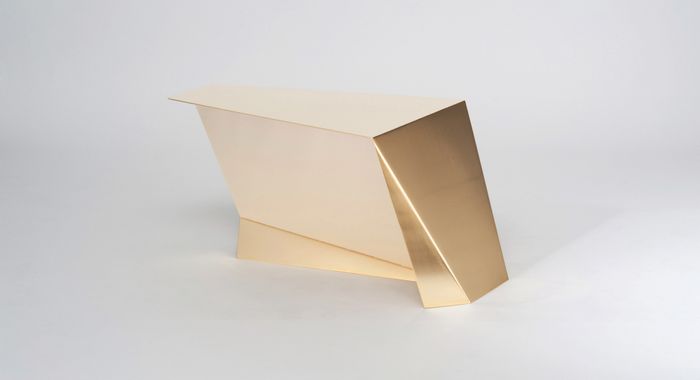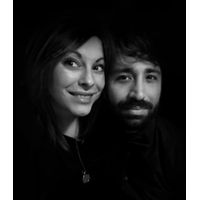20 May - 20 June 2020
On view on:
https://www.06datelier.com/rules-and-chaos
Rules and Chaos is a narrative display of refractions, a selection of existent and imagined works from Francesca Adami and Mauro Fragiotta's also known together as 06D Atelier. A virtual reality has been created to explain how they demolish the preconception of the boundaries between art and design with an exhibition tracing the path that brought them to their latest work Trans-forma, winner of the special award for the 14thArte Laguna Prize, the ARS Prize (art, reuse, sustainability) of Aluminium, assigned with the contribution of Ca' Foscari Sostenibile of Venice and CIAL (Italian Consortium of Aluminium Packaging).
The duo's practice started with self-produced furniture pieces with a very distinctive geometrical and minimalistic shapes, continuing with an investigation into influence of mathematics in nature's aesthetics and the phenomenology of perception.
South room
With the influence of M.C. Escher and Donald Judd's works, 06D Atelier's research started with playing with reflections to alter the representation of reality. The result are objects that transcend their function,for example, the marble console Alterwhich thanks to a mirroring stainless steel plate changes its shape drastically according to the point of observation. Also the glass mirror Ego which partially reflects a distorted and fragmented version of the surrounding environment. Both realized in early 2019 and are displayed in a central position of the first room.
Studies on the way to work the glass' surface to create an unexpected mirroring effect brought the duo to the use of machining process that slightly engraves the material. This processing was used as a language for the first time in the The Orbitmirror, produced in summer 2019. Seen as a canvas the glass mirror is graphically worked to render a different pattern at each piece of the Griffé Collection. Precise concentric circles in The Orbit mirror recallthe concentric pattern common in several natural structures, like the propagation of waves and paths traced by planets in space. Varying intersecting lines in the Interlacement n.1mirror refer to the unpredictable randomness of nature, while the distance between each circle in the mirror Radial n.1 follows the Fibonacci's sequence, a precise ratio observable in many constructs governed by nature itself. Displayed also in the first room is the only artwork conceived ad hoc for this exhibition, Aurea. It is a three dimensional artwork made of mirror polished stainless steel and portoro marble, an intersection of two rectangles following the golden ratio. The deceptive play of reflections makes the golden proportion difficult to read, and the perception of the sculpture is altered by a visual illusion making it appear as a physically impossible object.
Middle room, Entropia
Entropiais a composition of 9 mirrors, measuring 140 x 100 cm each, worked with the same technique used by the duo in the Griffée Collection's mirrors. It graphically represents the interlacement of ruled and chaotic arrangements in the universe.
In physics, entropy is the measure of the disorder or randomness of a system. The second law of thermodynamics states the total entropy of a closed system cannot decrease. Although the concept of entropy was originally a thermodynamic construct, it has been adapted in other fields of study, including information theory, psychodynamics, genetics, cosmology, economics, and evolution.
The artists have been fascinated by the paradox of the universe's entropy: in all observed systems the entropy decreases with the passing of time with the incrementation of disorder. Looking at the universe entropy is increasing over time, complex formations of matter such as stars, planets and life itself are ruled by harmonious laws, making the universe the only known system with increasing entropy.
With their mirror composition Entropiathe artists symbolise the universe, creating a bi-dimensional system formed by different sub-systems in which abstract geometric formations, lines and repetitions take place with an apparent causality and occasionally with a strict structured compositions. With a clear kandiskian inspiration, the lines engraved in the glass surface depict a state of the universe when order and disorder live together, with Fibonacci's patterns meeting random configurations flowing in a dialogue of geometries. The entropy of the pictured system is the sense of the oeuvre, essentially, the lack of information; what we miss to understand the scheme behind it and hence the universe.
Colours play a big part in the exhibition, different portions of the Entropiacomposition are displayed in as many declinations of the visible light spectrum, with the intent to express the vitality and vivaciousness of the physical manifestations of the cosmos observable so far.
North room, Trans-forma
Trans-forma is a snapshot of a state change, meant as rebirth, a physical idea of a transformation in the process of becoming. The artists through a “reverse process of construction”, starting from a perfect flat sheet of aluminium, work on a portion of the piece seeking an uncontrolled imperfection. One side of the sculpture is left flat and polished to mirror creating a shade of contrasting appearances to render a powerful and dynamic two way transformation at the moment it takes place. The manipulation is made through forceful impacts, compressions and bends with manual and mechanical tools to express a turbulent, high quantity of energy stage. A wrecked sheet of metal fades into a flawless even surface as a symbol of the unstoppable forces of the Nature transforming the matter by the passing of time, seen as a positive impulse of regeneration and renascence. The artists chose the aluminium as material of this sculpture for its capability of being reshaped ad recyclable ad infinitum, a rare quality to forge such a dynamic shape and concept, as its name suggests: Trans-forma, an Italian compound word, meaning form in transition. The duo started to work on this project at the beginning of the 2020 when the coronavirus was becoming a global pandemic. With the exponential spread of the Covid-19 disease, in conjunction with financial difficulties faced by the artists, this project assumed a more deeper meaning for them, and can be seen as a turning-point in the approach to their work, Trans-forma took on the meaning and value of renaissance, and pushed them to create the exhibition “Rules and Chaos”which connects the points between their latest works showing the course that brought them to create such a radical project. In the exhibition four sculptures are displayed in different versions and colours showing the variety and the unpredictability of outcomes possible from the same process of changing.
Exhibited artworks:
Alter + Ego, 06D Atelier, 2019. Marble, steel, glass
Griffée Mirrors, 06D Atelier, 2019-2020. Glass
Aurea, 06D Atelier, 2020. Marble, steel, glass
Entrpoa, mirror composition, 06D Atelier, 2020. Smoked glass
Trans-Forma, 06D Atelier, 2020. Recycled aluminium, raw mild steel

